





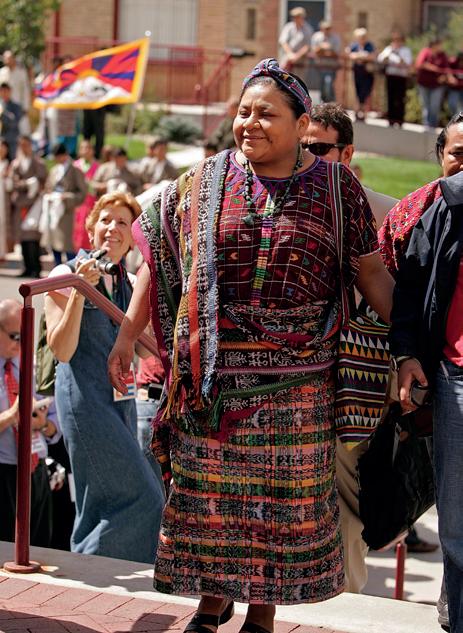

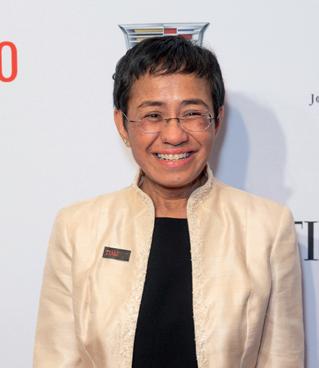

YOUNG ADULT
LEVEL 3 ILS B1
READERS
Downloadable Audio Files
CHIARA MICHELON CHANGING THE WORLD!
The ELI Readers collection is a complete range of books and plays for readers of all ages, ranging from captivating contemporary stories to timeless classics. There are four series, each catering for a different age group: First ELI Readers, Young ELI Readers, Teen ELI Readers and Young Adult ELI Readers. The books are carefully edited and beautifully illustrated to capture the essence of the stories and plots. The readers are supplemented with ‘Focus on’ texts packed with background cultural information about the writers and their lives and times.
B1 YOUNG ADULT
READERS
For this series of ELI graded readers, we have planted 5000 new trees.
 The FSC certification guarantees that the paper used in these publications comes from certified forests, promoting responsible forestry management worldwide.
The FSC certification guarantees that the paper used in these publications comes from certified forests, promoting responsible forestry management worldwide.
CHANGING THE WORLD!
CHIARA MICHELON
YOUNG ADULT
READERS
Chiara Michelon
Changing the World!
English version
Pauline Russo
YOUNG ADULT ELI READERS
Series Editors
Paola Accattoli, Grazia Ancillani, Daniele Garbuglia (Art Director)
Graphic Design
Andersen the Premedia Company
Layout
Emilia Coari
Production Manager
Francesco Capitano
Photo Credits
Shutterstock, Alamy
© 2023 ELI S.r.l.
P.O. Box 6 - 62019 Recanati - Italia Tel. +39 071 750701
Fax +39 071 977851
info@elionline.com
www.elionline.com
Typeset in 11,5 / 15pt Monotype Dante
ERA 344.10
ISBN 978-88-536-3970-7
First edition March 2023
www.eligradedreaders.com
Disclaimer
This book has been written using information in the public domain from official sites, online biographies and interviews, with the sole reason to provide useful information from reliable sources, known to be true about persons of great ethical and social importance. It is not intended as a complete biography of the individuals described here, but as a simple introduction to further study. Although every care has been taken to ensure the accuracy of the information in this publication, we apologise for any inaccuracies there may be and if we have missed something, we would ask you to write to us at: redazione@elionline.com
Printed in Italy by Tecnostampa Pigini Group Printing Division – Loreto – Trevi
Contents The parts of the text on the audio are indicated by the following symbols: Start End 6 Pre-reading Activities 8 Malala Yousafzai 14 Activities 16 Nelson Mandela 22 Activities 24 Wangari Maathai 30 Activities 32 Muhammad Yunus 38 Activities 40 Rigoberta Menchú Tum 46 Activities 48 Thich Nhat Hanh 54 Activities 56 Leymah Gbowee 62 Activities 64 Kailash Satyarthi 70 Activities 72 Maria Ressa 78 Activities 80 Ian Kiernan 86 Activities 88 Dossier – Let’s not forget 90 Dossier – Peacekeeping Organisations 92 Dossier – Important words 94 Test Yourself 96 Syllabus
Writing
1 Do you wish for world peace? Write an email to your friend talking about how you dream of having peace in the world.

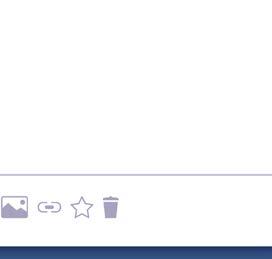
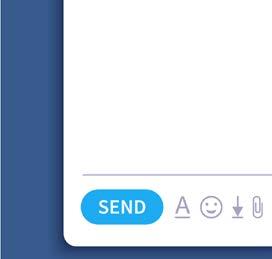


Speaking
2 Do you know these famous people? What do you know about them? Tell the class about them.
The 2030 Agenda – Goal 16
3 Have you heard of “Extinction Rebellion”? What do you think it is? Discuss in pairs and compare your ideas with the rest of the class. You can look for information on the internet.
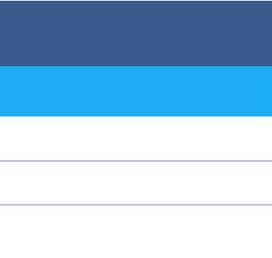
PRE-READING ACTIVITIES 6
Where are they from?
4 Match the photos of the following famous people to their country of origin.
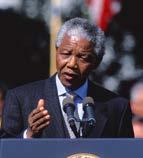
a Bangladesh
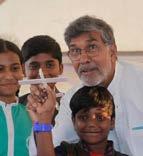

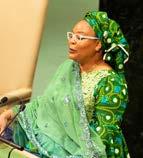
b Vietnam
c South Africa
d Liberia
e India
f Kenya


g Pakistan

h Guatemala
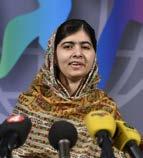
7
1 Malala Yousafzai
5 Rigoberta Menchú Tum
2 Nelson Mandela
6 Thich Nhat Hanh
3 Wangari Maathai
7 Leyman Gbowee
4 Muhammad Yunus
8 Kailash Satyarthi
THE RIGHT* TO AN EDUCATION
Malala Yousafzai
A secret blog
Malala was born on 12th July 1997 in the Swat valley in Pakistan, in a peaceful village called Mingora. The Yousafzai family, who were Pashtuns, were educated people. Malala’s grandparents were teachers and her father was a human rights activist*. Her parents named Malala, their first child, after a famous Pakistan heroine. In her country, male children are preferred but her parents welcomed her with great happiness. Malala was very intelligent and worked hard at school. She wanted to be independent and have a good job when she grew up.
At the end of 2007, the Taliban invaded the region where the Yousafzai lived and they had to go and live with relatives in Haripur. No entertainment was allowed, and women did not even have the right to do simple things like going to school, and were forced to wear the burqa*, something that Malala thought was really unfair. She worked in secret for the BBC, writing a blog about life in Pakistan and the things that women and children were not allowed to do. She wrote the blog under the name Gul Makai, “cornflower”. She also made two documentaries with the New York Times, one on
right: what a person is allowed to have or do, and not have it taken away activist a person who works hard to make important changes in society
8
2
burqa a dark veil worn by Muslim women which covers their face but not their eyes
“ I don't mind if I have to sit on the floor at school. All I want is education. And I'm afraid of no one.” ”

THE RIGHT TO AN EDUCATION
the schools closing and another on the problems of girl students. Everyone knew that Malala had written the Gul Makai blog. In December 2011, the Pakistan government gave her the National Peace Prize. At that time, the Taliban were losing control of the country and it seemed that life was returning to normal. She returned to Mingora, and more importantly, she was able to go back to school, even if she still had to wear the burqa. Malala was happy because she had missed going to school a lot.
The assassination attempt
On 9th October 2012, near exam times, Malala was on a bus with her schoolfriends, when two Talibans stopped the bus and asked where Malala was. When they saw her, they shot at her and hit her in the head. She was taken to hospital, first in Pashawar and then to Birmingham in Great Britain. Fortunately, she did not die. The Taleban had wanted to eliminate her just because she had become a symbol of the fight
Women in Pakistan
Still today, in Pakistan, women suffer discrimination*. Almost all women are not allowed to work, study or are not even free to leave their own homes. Some have to marry men who are much older than they are, even if they don’t love them. Women are considered less important than men. The birth of a baby girl is a problem for families and is not a happy event.
for the right to an education. Thousands of children from all over the world wrote to her in hospital. While she was there, she continued to read and study, and she realised that, sadly, she would have to make a new life for herself, far from her home country.
Her family could not return to their country because the Taliban had taken control of Pakistan again. However, thanks to the media attention around her attack, the United Nations
discrimination looking at people differently because of age, race or gender
10
started a petition* demanding that, by 2015, all children should be allowed to go to school. This was the first official document in Pakistan on the right to education. While Malala was living in Britain, the Pakistan President, Zardari, gave 10 million dollars to education and the Malala Foundation was also started to help girls all over the world to get an education.
The right to an education
On the day of her sixteenth birthday, Malala was invited to make a speech at the United Nations building in New York. In front of a very important audience, she spoke about her fight for the right to education and invited everyone to fight, in any way possible, for the right of every child, not just girls, to have an education. Education
is, in fact, the only way to fight discrimination. For the occasion, she wore the shawl* that had belonged to Benazir Bhutto, the political leader who had tried to change Pakistan.
In 2014, she became the youngest person to win the Nobel Peace Prize, which she shared with the Indian activist, Kailash Satyarthi, for their fight for all children to have an education. “Let us pick up our books and our pens, they are the most powerful weapons. One child, one teacher, one book, one pen can change the world.” Many schools petition a
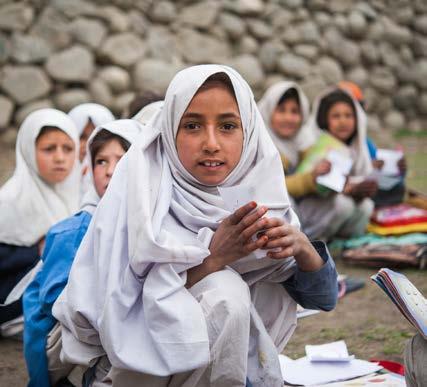
11
Schoolgirls in Pakistan.
document signed by many people to protest about something shawl a piece of cloth you wear on your shoulders
Malala Yousafzai
“ Education is power for women. The Talibans are closing girls’ schools because they don’t want women to have power.”
THE RIGHT TO AN EDUCATION The 2030 Agenda
The 2030 Agenda is a programme of action for all people, the planet and well-being. It was signed on 25th September 2015 by the 193 member countries of the United Nations and has 17 goals for sustainable development. These should be achieved by 2030 and are environmental*, economical and social in nature. The programme is not the answer to all world problems but is a good common base to start from and go towards building a different world that allows everyone to live in a sustainable way.
today remember her role as a female activist, especially on 20th November, when they celebrate World Children’s Day. Her work is based on ideas, but also on doing real things, like opening schools for people escaping from dangerous situations in their own countries.
She became one of the heroes of Global Goals, or the 2030 Agenda, together with many other activists and celebrities like Anastacia, Kate Winslet, Jennifer Lopez and Bill Gates. In 2015, world leaders promised, within fifteen years, to complete 17 goals towards sustainable* development. The most important goals include stopping extreme poverty, fighting against inequality* and injustice*, and stopping climate change*.
Together with her friend, Greta Thunberg, Malala has said that the climate crisis is having negative effects on basic human rights, like the right to education.
environmental regarding the environment, the natural world we live in sustainable helping the environment inequality not seen as the same as others, not being equal
injustice something that is not right or fair climate change when weather patterns become different because of pollution
12
“ When the whole world is silent, even one voice becomes powerful.”
No fear
Malala studied philosophy, politics and economics at Oxford University, so that she could become a politician and help give the women in her own country a future. She got her university degree in 2020 and then took some time during the pandemic to try and understand what she wanted to do with her life, like anyone of her age. In 2021, she married Asser Malik, in Birmingham, in an Islamic ceremony in the Urdu language.
I am Malala
This book tells the story of Malala’s life. She wrote it together with Christina Lamb, an international journalist and expert on Pakistan and Afghanistan. It is a very emotional story about her courage and her dream to change the world. “You must speak the truth. The truth will abolish fear”.

Malala continues her fight for civil rights, education and women’s rights. She does this with great courage and without any fear, telling the truth and as an international symbol for the women who are fighting for their right to education and freedom.
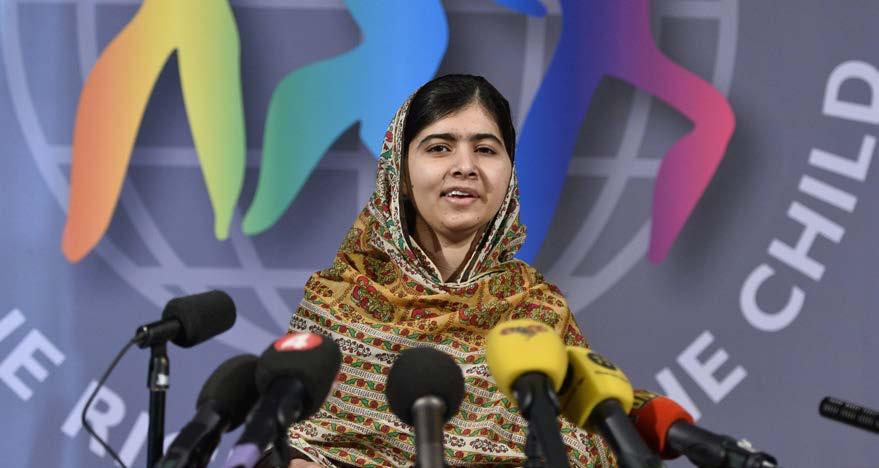
13
ACTIVITIES
Reading Comprehension
1 Choose the correct answer.
1 Malala is the name of:
a a teacher in Pakistan
b a heroine from Pakistan
c Malala’s grandmother
2 The burqa is:
a a dark veil
b a Taliban book
c something prohibited by Muslims
3 Where was Malala attacked?
a At school
b On a bus
c In front of her house
4 Which country did Malala have to live in?
a Afghanistan
b Italy
c Great Britain
5 In which city is the headquarters of the United Nations?
a London
b New York
c Paris
6 How many goals does the 2030 Agenda have?
a 20 b 15 c 17
2a Work with a partner. Discuss what the following words mean to you. Write a short definition of them and compare them with the class.
1 education: ......................................................................................................
2 inequality: .......................................................................................................
3 prohibited: ......................................................................................................
4 poverty: ...........................................................................................................
14
2b Now think about the opposite meaning of these words. Write a short definition of them and compare them with the class.
1 education: the opposite is ......................................................................

2 inequality: the opposite is ......................................................................
3 prohibited: the opposite is .....................................................................
4 poverty: the opposite is ...........................................................................
Writing
3 Imagine you are Malala. How would you start your autobiography? Start with “I am Malala.“
Roleplay
4 Work in pairs. Decide who will play the role of Malala and who will be the journalist. Write 5 questions and answers for a TV interview. You could also make a video of the interview with your mobile phone to show to your class.
15
I am Malala…










 The FSC certification guarantees that the paper used in these publications comes from certified forests, promoting responsible forestry management worldwide.
The FSC certification guarantees that the paper used in these publications comes from certified forests, promoting responsible forestry management worldwide.



















